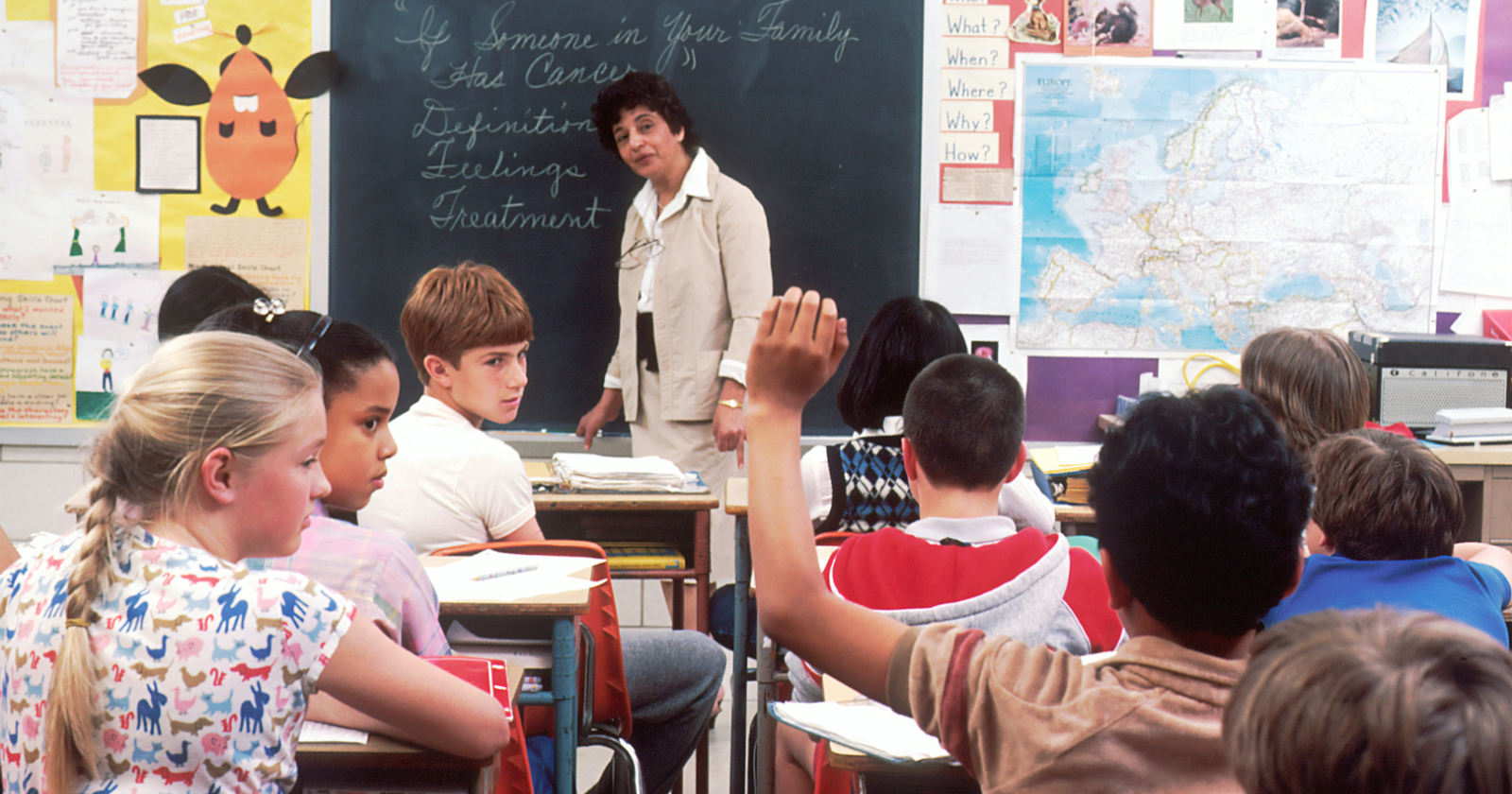Walk into any classroom in 1985, and you’d hear things that would spark Twitter outrage today. Teachers commanded absolute authority, parents reflexively took their side, and nobody had heard of trauma-informed anything. These weren’t necessarily bad educators—many were beloved figures who shaped successful lives. They just worked in an era with wildly different rules.
The gulf between then and now reveals how profoundly our understanding of childhood development has evolved. What passed for character-building tough love in the Reagan years now reads as potential emotional damage. Here are eight everyday teacher phrases from the ’80s that would likely trigger immediate HR intervention today.
1. “I don’t care what happens at home”
The universal shutdown for excuse-makers. Parents divorcing? Dad lost his job? Teacher didn’t want to hear it. Your homework was still due, and your problems stayed at the door.
This rigid boundary between home and school made sense in an era that prized emotional toughness over emotional intelligence. Teachers saw themselves as academic instructors, period—not social workers or therapists. Today we understand that kids can’t simply switch off trauma at 8 AM. The evolution toward whole-child education acknowledges what should have been obvious: hungry, scared, or troubled kids struggle to learn long division.
2. “You’re the worst class I’ve ever had”
Every substitute teacher’s go-to guilt trip. Sometimes your regular teacher would drop it too, usually right before winter break when everyone was bouncing off walls. The entire class would deflate under the weight of collective shame.
This kind of group punishment violated everything we now know about effective classroom management. Broad condemnation doesn’t improve behavior—it just erodes trust. Modern teachers learn to address specific actions without attacking identity. They understand that “worst class ever” becomes a self-fulfilling prophecy, giving kids permission to live down to expectations. The shift from shame to supportive correction represents genuine progress in understanding motivation.
3. “Maybe you’re just not college material”
Guidance counselors dispensed this verdict like career fortune-tellers, often after glancing at a single report card. One bad semester in algebra, and suddenly you’re being handed community college pamphlets or vocational brochures.
The casual brutality of sorting fourteen-year-olds into life tracks seems almost dystopian now. These pronouncements often reflected class bias more than actual ability—working-class kids heard it constantly while wealthy underachievers got tutors and second chances. Today’s educators understand that teenage performance doesn’t predict adult capacity. Modern schools emphasize growth over fixed ability, keeping doors open rather than slamming them shut based on adolescent struggles.
4. “Stop crying or I’ll give you something to cry about”
Borrowed straight from the parental playbook, this threat treated tears as manipulation to be crushed rather than emotion to be processed. Crying meant weakness, and weakness was intolerable.
We now recognize this as exactly wrong. Emotional regulation is a learned skill, not an innate character trait. Threatening distressed children only teaches them to hide feelings, not handle them. Today’s teachers receive training in de-escalation and emotional support, understanding that kids who feel safe learn better than kids who feel threatened. The toxic equation of tears with weakness has given way to recognizing emotional expression as human and healthy.
5. “If you don’t like it, there’s the door”
The ultimate dare. Some teachers would actually gesture toward the exit, calling your bluff about leaving. Take the dare, and you’d face suspension. Stay, and you’d submitted to their authority.
Related Stories from The Artful Parent
This crystallized the old model: comply or face exile. No negotiation, no discussion, no effort to understand why a student might be struggling. Modern restorative practices recognize that the kids most likely to walk out are often those who most need to stay in. Today’s teachers work to keep students engaged, not dare them to leave. Education as a right rather than a privilege means nobody should be challenged to abandon their own learning.
6. “Girls aren’t good at math anyway”
Sometimes followed by “but you’re doing okay for a girl”—a compliment that stung worse than an insult. Female teachers often said this to female students, perpetuating limitations they’d internalized themselves.
The casual acceptance of gendered intelligence feels prehistoric now. These comments, meant as comfort, instead planted seeds of doubt that bloomed into abandoned ambitions. Imagine how many potential scientists and engineers redirected their lives based on offhand remarks from authority figures. Today, such comments would trigger immediate retraining. The recognition that gender gaps reflect bias, not biology, transformed how educators approach all students’ potential.
7. “Your parents will hear about this—if they even care”
The double insult: threatening parental consequences while suggesting parental indifference. Usually aimed at kids from “those families”—the ones teachers had already written off.
This revealed ugly assumptions about class, race, and family structure. Single mother working two jobs? Must not care. Parents don’t attend PTA meetings? Obviously uninvested. Modern educators recognize that involvement looks different across cultures and circumstances. A parent who can’t attend conferences might still check homework nightly. Today’s teachers build bridges to families rather than burning them with assumptions.
8. “You’ll never amount to anything”
The death sentence, usually delivered after minor infractions. Talk back once, fail a test, get caught passing notes—suddenly your entire future was written. Teachers became fortune-tellers, and the fortune was always bankruptcy and failure.
- The zero-click era is here and publishers are still pretending it isn’t - The Blog Herald
- If you’re over 70 and still do these 8 things daily, your brain is aging remarkably well - Global English Editing
- Psychology says if you still smile at strangers even when you’re having a bad day, you display these 8 beautiful traits - Global English Editing
This represents everything wrong with fixed mindset thinking. Tell a kid they’re destined to fail, and they might just believe you. Modern educators understand that teenage behavior doesn’t determine adult success. They’re trained to separate actions from identity, addressing mistakes without condemning futures. The most successful adults often include former “problem kids” whose teachers swore they’d never amount to anything.
Final thoughts
These phrases weren’t outliers—they were classroom standard. Most ’80s kids heard variations weekly. We survived, even thrived, but survival doesn’t equal harmless. Some kids internalized these verdicts, carrying them like stones for decades.
The transformation isn’t about coddling or political correctness. It’s about recognizing that words from authority figures during formative years carry tremendous weight. They can become internal voices that either lift or limit. Today’s teaching standards reflect hard-won knowledge about development, trauma, and human potential that simply didn’t exist in staff rooms forty years ago.
What’s most striking isn’t what teachers can no longer say—it’s what they now understand. That learning happens best in emotional safety. That potential isn’t fixed at fourteen. That every kid, regardless of background, deserves educators who see possibility rather than predetermined failure. The phrases that would end careers today are artifacts from when we knew far less about how children actually grow, learn, and become themselves.



